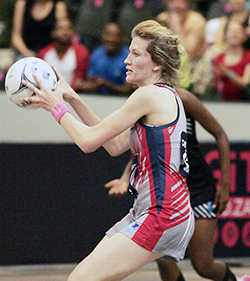
Karla Mostert
Photo: Johan Roux |
The success of netballers Adele Niemand (former Kovsie) and Karla Mostert (captain of the Kovsie netball team) continues - they represent Kovsies, the provincial Crinums, as well as the national SPAR Proteas as goal-keeper and goal defender, respectively. The UFS is also very proud of their inclusion in the national team for the upcoming 2015 World Cup in Australia.
On 6 June 2015, Niemand and Mostert played for the Free State Crinums, who overpowered the Gauteng Jaguars in the Brutal Fruit Netball Premier League (NPL). This win secured the championship title for the Crinums for the second time in a row.
“Our aim was to improve with each game. We did this throughout the league. The final game against the Jaguars was definitely our best game, so we are very satisfied. The NPL prepared us and gave us game time, which I think, is great preparation for the Diamond Challenge,” said Mostert.
Niemand and Mostert represented South Africa at the Diamond Challenge in Margate from 14 to 18 June 2015.
Prior to the event, Burta de Kock, Head Coach of the university’s team, said, “The Diamond Challenge in Margate will be hard, because Zambia, Uganda and Malawi want to be the best in Africa. But SA has enough brilliant players to do the trick for us, and we also have a great leader as captain.”
Niemand and Mostert form part of the national squad selected for the upcoming 2015 World Cup in Australia. Kovsie Lauren-Lee Christians from the UFS is the only non-travelling substitute for the World Cup. In their group, the team will compete from 7 to 16 August 2015 against Malawi, Singapore and Sri Lanka.
For the upcoming games against the world’s best in Sydney, Niemand has set a personal goal, namely to be the best by playing every game as if it's her last, and in so doing, aims to maintain the high standard of the team.
Their coach’s words of encouragement for the World Cup are: “Just go out with passion and enjoy every second. Never forget you are our CHAMPS!!”
The SPAR Proteas have indeed proven to be champions by beating Zambië 63 - 38 in the opening match of the challenge on 16 June 2015 at the UGU Sports Centre. They continued to beat Malawi convincingly by 43 - 33, and thrashed Uganda with a score of 56 - 39 to maintain their unbeaten run. The Proteas managed to uphold their lead to the end and thereby secured the tournament trophy win a win of 40 - 35. In the first two games against Zambia and Malawi, Mostert and Niemand was respectively Player of the Match.
The UFS is also proud of Maryka Holtzhausen, a former Kovsie now captaining the Proteas. Ilze du Pisanie, also a former Kovsie, is the conditioning coach for the Proteas.